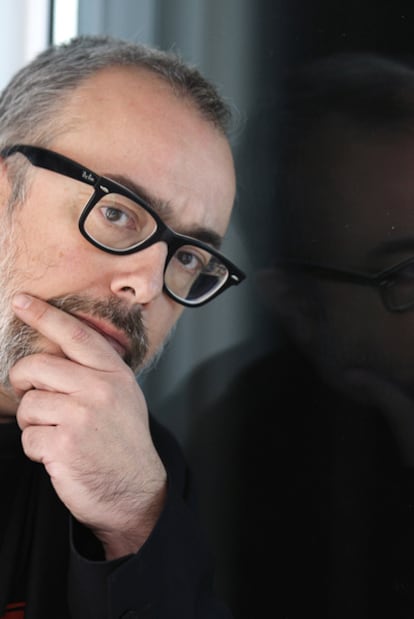"My best years were at the Academy"
The former president of Spain's Cinema Academy returns with a new black comedy
Director Alex de la Iglesia returns to cinema screens this Friday with the black comedy La chispa de la vida (or, The spark of life). Don't be fooled by the title, which refers to a famous Coca-Cola advertising slogan ? it's the only hint of optimism in this dark, dark tale. The film stars comedian José Mota as an out-of-work ad man who suffers a bizarre accident that leaves him trapped in such a way that no one can figure out how to save him. Facing death, he decides to use his skills to sell the TV rights to his predicament and safeguard the future of his wife (Salma Hayek) and family. Dealing with the crisis and media morality, it's typical De la Iglesia, incapable of being obvious or bowing to conventions.
"If you have to resign yourself to survive, why or for whom do you survive?"
Question. Every day it's normal for mortals to give in three or four times. To the boss, their partner, children, parents, lovers... Isn't that the theme of La chispa de la vida?
Answer. It's exactly about that, about understanding that life is about giving in ? above all now ? and that you are going to find yourself in situations in which you will have to resign yourself to surviving. And that is the conflict: if you have to resign yourself to survive, why or for whom do you survive? You have to get off this carousel; if not, you're just one more model horse.
Q. You yourself have said that this is your bitterest film. But all of them are, no?
A. All of them are, but it's funny: many people have said to me that this one is full of hope. Maybe it's true. [...] Anger and revenge drive this film. Like A Sad Trumpet Ballad and my other films. But here the conclusions are the same, the conclusions are hope and optimism. So this film has its own life. At first what I liked about the title was putting an end to that "I want to give the whole world a message of peace" thing because the story is, at first, the complete opposite. But at the end we recover dignity. We can kick back, we can. There is hope.
Q. And that kick you speak of, it goes up the ass of the politicians, the journalists and of people's love of morbidity?
A. Yes. The truth is it scares me when I realize that I respect everyone less and less every day. Even though I suddenly see myself as just one more character in this comedy.
Q. How do you see cinema today? That is, the relation between people and cinema?
A. The cinema is like society: you only see it through a grotesque mirror. One of the things that saddens me most is that someone with a specific economic and political interest has muddied the relationship between cinema and the public. That is something that has been worked for. [...] We put our foot in it every day, I put my foot in it. We are excessive, absurd, but it is impossible to lose our relationship with the audience. We have to work for that.
Q. Now you are no longer president of the Cinema Academy, do you feel frustrated or regretful?
A. I have to say I still think the same. I stopped working at the Academy because of a disagreement over the "Sinde" [anti-downloading] law and about how it was dealt with, and I continue to disagree. There has to be a law, but another one, made with the consensus of all those affected. Apart from that, the two best years of my life were the ones I spent at the Academy.
Q. How is your relationship with former Culture Minister Ángeles González-Sinde after the disagreement?
A. Well, I'd like her to come to the premiere. And that is the key: I can be absolutely against the way you think about the world and be your friend. It's possible, it's possible. But that will never be understood in this country.

Tu suscripción se está usando en otro dispositivo
¿Quieres añadir otro usuario a tu suscripción?
Si continúas leyendo en este dispositivo, no se podrá leer en el otro.
FlechaTu suscripción se está usando en otro dispositivo y solo puedes acceder a EL PAÍS desde un dispositivo a la vez.
Si quieres compartir tu cuenta, cambia tu suscripción a la modalidad Premium, así podrás añadir otro usuario. Cada uno accederá con su propia cuenta de email, lo que os permitirá personalizar vuestra experiencia en EL PAÍS.
¿Tienes una suscripción de empresa? Accede aquí para contratar más cuentas.
En el caso de no saber quién está usando tu cuenta, te recomendamos cambiar tu contraseña aquí.
Si decides continuar compartiendo tu cuenta, este mensaje se mostrará en tu dispositivo y en el de la otra persona que está usando tu cuenta de forma indefinida, afectando a tu experiencia de lectura. Puedes consultar aquí los términos y condiciones de la suscripción digital.








































